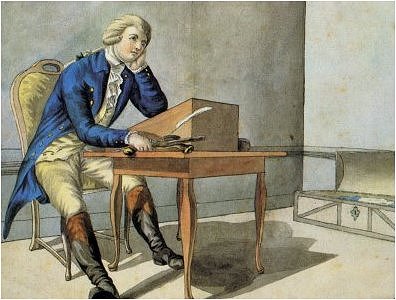The Sorrows of Young Werther (10) by J.W. von Goethe

The Sorrows of Young Werther (10)
by J.W. von Goethe
30 May 1771
What I have lately said of painting is equally true with respect to poetry. It is only necessary for us to know what is really excellent, and venture to give it expression; and that is saying much in few words.
To-day I have had a scene, which, if literally related, would, make the most beautiful idyl in the world. But why should I talk of poetry and scenes and idyls? Can we never take pleasure in nature without having recourse to art?
If you expect anything grand or magnificent from this introduction, you will be sadly mistaken. It relates merely to a peasant-lad, who has excited in me the warmest interest. As usual, I shall tell my story badly; and you, as usual, will think me extravagant. It is Walheim once more–always Walheim–which produces these wonderful phenomena.
A party had assembled outside the house under the linden-trees, to drink coffee. The company did not exactly please me; and, under one pretext or another, I lingered behind.
A peasant came from an adjoining house, and set to work arranging some part of the same plough which I had lately sketched. His appearance pleased me; and I spoke to him, inquired about his circumstances, made his acquaintance, and, as is my wont with persons of that class, was soon admitted into his confidence. He said he was in the service of a young widow, who set great store by him. He spoke so much of his mistress, and praised her so extravagantly, that I could soon see he was desperately in love with her. “She is no longer young,” he said: “and she was treated so badly by her former husband that she does not mean to marry again.” From his account it was so evident what incomparable charms she possessed for him, and how ardently he wished she would select him to extinguish the recollection of her first husband’s misconduct, that I should have to repeat his own words in order to describe the depth of the poor fellow’s attachment, truth, and devotion.
It would, in fact, require the gifts of a great poet to convey the expression of his features, the harmony of his voice, and the heavenly fire of his eye. No words can portray the tenderness of his every movement and of every feature: no effort of mine could do justice to the scene. His alarm lest I should misconceive his position with regard to his mistress, or question the propriety of her conduct, touched me particularly. The charming manner with which he described her form and person, which, without possessing the graces of youth, won and attached him to her, is inexpressible, and must be left to the imagination. I have never in my life witnessed or fancied or conceived the possibility of such intense devotion, such ardent affections, united with so much purity. Do not blame me if I say that the recollection of this innocence and truth is deeply impressed upon my very soul; that this picture of fidelity and tenderness haunts me everywhere; and that my own heart, as though enkindled by the flame, glows and burns within me.
I mean now to try and see her as soon as I can: or perhaps, on second thoughts, I had better not; it is better I should behold her through the eyes of her lover. To my sight, perhaps, she would not appear as she now stands before me; and why should I destroy so sweet a picture?

The Sorrows of Young Werther (Die Leiden des jungen Werther) by J.W. von Goethe. Translated by R.D. Boylan.
To be continued
fleursdumal.nl magazine
More in: -Die Leiden des jungen Werther, Goethe, Johann Wolfgang von

